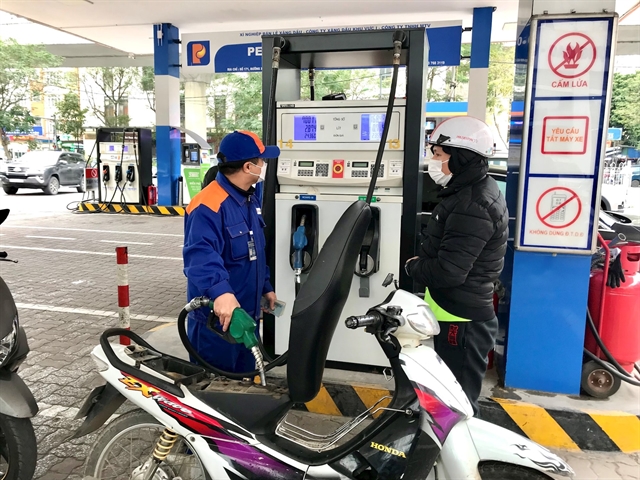 Economy
Economy

 |
| Participants discuss the advantages of Industry 4.0 on enterprises. — VNA/VNS Photo Văn Điệp |
HÀ NỘI — Việt Nam is striving for sustainable development on the basis of improving growth quality and taking advantage of the Fourth Industrial Revolution to increase labour productivity and competitiveness to move up in the global value chain.
This was the messageheard at the seminar on ASEAN 4.0: entrepreneurship in the Fourth Industrial Revolution held in Hà Nội yesterday.
It forms part of activities ahead the World Economic Forum (WEF) ASEAN 2018 that will take place here from September 11-13.
The event organised by the Ministry of Foreign Affairs saw the participation of representatives from ASEAN embassies in Việt Nam, ministries, leaders of top local technology enterprises and economic experts.
Bùi Thanh Sơn, Deputy Minister of Foreign Affairs said Việt Nam was determined to build the pro-business Government and improve institutional reform, creating a favourable environment for businesses and people, especially the younger generation as well as start-up spirit and the country’s dynamism.
“The Industry 4.0 is changing profound aspects of social life. It is important to recognise the impact of this revolution on each economy, organisation and people,” he said.
Việt Nam is working to be one of the world’s top 10 biggest software and digital content outsourcing service nations, with about a million employees in the IT field by 2020, Sơn said.
The Deputy Foreign Minister also highlighted the opportunities for ASEAN developing nations to make fast, sustainable and inclusive development in the fourth revolution.
ASEAN is the world’s sixth-largest economy with 630 million people, of whom, 260 million have a regular access to the Internet. The number is expected to increase to 480 million by 2020. In Việt Nam, about 60 percent of the 93 million population are under 35 years of age. They have a quick access to new technology and about 55 percent of the population uses the internet.
Sơn cited estimates of Google and Singaporean Temasek groups, saying that the Southeast Asian internet economy will reach US$200 billion by 2025, or 6 per cent of the region’s total GDP. “This is a favourable foundation and a big enough market for innovation and investment in new business models in the region as well as in Việt Nam,” Sơn said.
However, he also highlighted challenges like large-scale automation, changing business models that cause disturbance, displacement, and employment replacement in large scale, especially in labor-intensive industries.
“This poses an urgent need for vocational education and training in many ASEAN countries,” he said.
According to the International Labour Organisation (ILO), about 56 per cent of the workforce of five ASEAN countries, namely Malaysia, Indonesia, the Philippines, Thailand and Việt Nam, are at high risk of being replaced by new technologies in about two decades. Son suggested each ASEAN Government and ASEAN business promotes self-reliance, find new ways to adapt to and prosper in a fast-paced world under the influence of new technology.
Ibnu Hadi, ambassador of Indonesia to Việt Nam shared Indonesian roadmap for making the country’s 4.0. Accordingly, Indonesia has focused on five key sectors in the revolution including textile, agriculture, garment, automotive and electronics to take advantages of the Industry 4.0. These industries are most involved in digitalisation in the future.
He said Indonesia in particular and the ASEAN in general are moving forward with both opportunities and challenges.
It was the reason that governments should provide appropriate policies and directions as well as improving education to prepare for this era which needs high quality human resources, he said.
He added that the ASEAN community is a unified market that requires co-ordinated co-operation and mutual benefit for all nations.
Talking about impacts of the digitalisation evolution on business sector in ASEAN countries, Dennis Brunetti, Eurocham president said it was necessary to have a connection mechanism for everyone.
Việt Nam should have a mechanism to support businesses when investing in the country in the field of innovation. Việt Nam should focus on investing in a broad and stable telecommunications system, which has a database to digitise the economy, develop education, transport and connect people.
Lê Quốc Hữu, lead engineer on Smart City at Viettel Group said Vietnamese firms should have adequate awareness on impacts of the Fourth Industrial Revolution and digital economy.
“Local companies should update new technology trends, changing their management methods as well as applying science and technology into production. Renewal in organisational structure and business models are the key issue to decide Vietnamese businesses’ development,” he added.
He said enterprises should build transition strategies within three to five years to gradually shift to Enterprise 4.0, building strengths and core values for enterprises based on breakthrough factors of innovation and creating digital culture.
Time to seek for development momentum
Việt Nam and the World Economic Forum will co-host the ASEAN World Economic Forum 2018 (WEF ASEAN 2018) in Hà Nội from September 11 to 13.
This is one of Việt Nam’s biggest foreign events this year, attracting more than 1,000 domestic and international delegates.
The WEF ASEAN 2018 co-hosting is the initiative of Prime Minister Nguyễn Xuân Phúc and Executive Chairman of the World Economic Forum Klaus Schwab.
Under the theme "ASEAN 4.0: Enterprise Spirit in the Fourth Industrial Revolution", the conference is expected to promote dialogues and share the vision, ideas and policy directions related to the 4.0 revolution in ASEAN and around the world. The agenda of the WEF ASEAN 2018 was also elaborated on this year’s ASEAN theme: “ASEAN Resilience and Innovation”.
Nguyễn Văn Thảo, personal assistant to the Vietnamese Minister of Foreign said the PM’s opinion on the WEF ASEAN 2018 is to discuss contents which closely link to ASEAN countries’ demand.
“We live in a global era; we must discuss the global issues. However, ASEAN is unique, so the content must be appropriate for our region,” he added. — VNS

.jpg)


